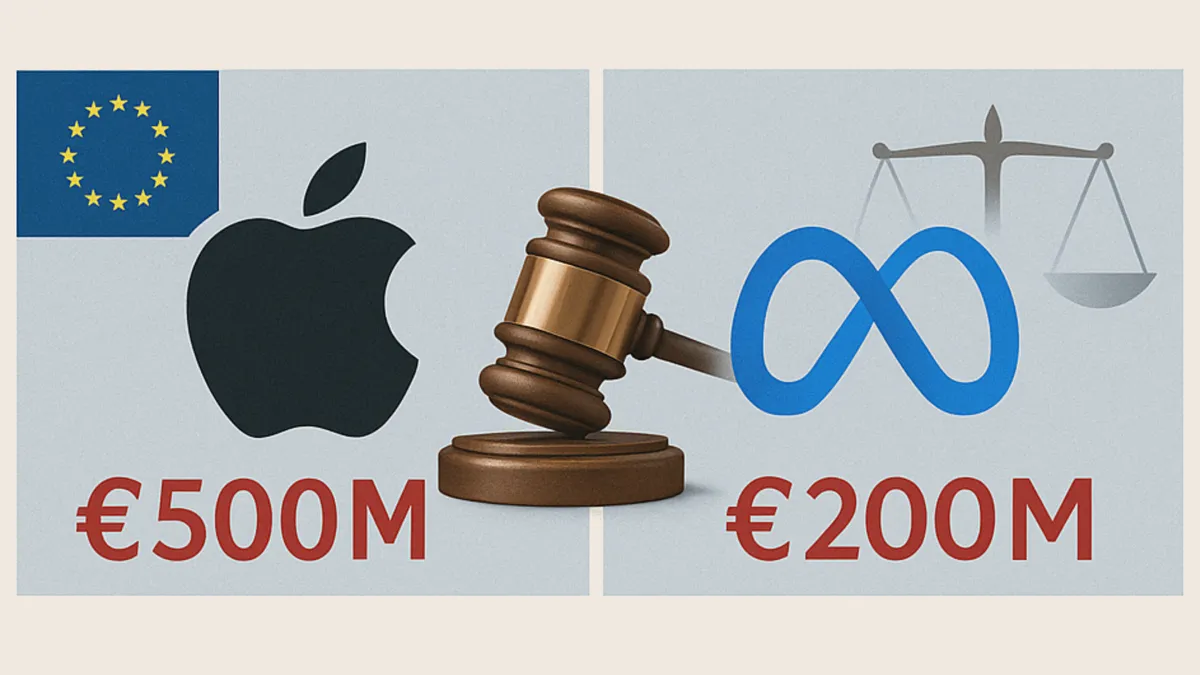
The European Commission has issued landmark penalties against two tech giants for violating the Digital Markets Act (DMA), marking the first enforcement actions since the regulation became binding.
Get the PPC Land newsletter ✉️ for more like this
On April 23, 2025, the Commission imposed fines of €500 million on Apple and €200 million on Meta for failing to comply with key obligations designed to ensure fair competition and consumer choice in digital markets. This decisive action comes just four days ago, highlighting the EU's commitment to enforcing its new regulatory framework.
According to the European Commission press release, "the European Commission found that Apple breached its anti-steering obligation under the Digital Markets Act (DMA), and that Meta breached the DMA obligation to give consumers the choice of a service that uses less of their personal data."
The decisions followed extensive dialogue with both companies, during which they had opportunities to present their arguments and perspectives. This thorough process underscores the Commission's commitment to procedural fairness while firmly enforcing its new regulatory powers.
Apple's violation centered on anti-steering restrictions that prevented app developers from informing customers about alternative purchasing options outside the App Store. Teresa Ribera, Executive Vice-President for Clean, Just and Competitive Transition, stated, "Apple and Meta have fallen short of compliance with the DMA by implementing measures that reinforce the dependence of business users and consumers on their platforms."
The Commission determined that Apple's restrictions prevented both app developers and consumers from benefiting from alternative distribution channels and potentially cheaper offers. Critically, Apple "failed to demonstrate that these restrictions are objectively necessary and proportionate," according to the investigation's findings.
The regulatory body ordered Apple to remove both technical and commercial restrictions on steering and to refrain from similar conduct in the future. This requirement strikes at the core of Apple's App Store business model, which has historically limited how developers can communicate with their customers about alternative payment methods.
While the Commission's action against Apple was severe, it also acknowledged positive steps taken by the company. The investigation into Apple's user choice obligations was closed thanks to "early and proactive engagement by Apple on a compliance solution," suggesting a mixed approach by the tech giant to DMA requirements.
Meta's violation involved its "consent or pay" model introduced in November 2023. Under this framework, EU users of Facebook and Instagram faced a binary choice: consent to personal data combination for advertising purposes or pay for an ad-free subscription service.
The Commission ruled this model non-compliant because it failed to offer users a specific choice to opt for a service using less personal data while remaining equivalent to the personalized ads service. Additionally, Meta's approach did not allow users to freely exercise their right to consent to data combination.
Interestingly, the Commission noted that Meta introduced another version of its advertising model in November 2024, offering a new option that allegedly uses less personal data. This change came after "numerous exchanges with the Commission," suggesting ongoing dialogue influenced Meta's approach. However, the recent fine specifically concerns the period from March 2024, when DMA obligations became binding, until the new model's introduction in November 2024.
Henna Virkkunen, Executive Vice-President for Tech Sovereignty, Security and Democracy, emphasized that "enabling free business and consumer choice is at the core of the rules laid down in the Digital Markets Act. This includes ensuring that citizens have full control over when and how their data is used online."
In a separate decision announced the same day, the Commission determined that Meta's Facebook Marketplace should no longer be designated under the DMA. This followed Meta's March 2024 request to reconsider the designation and reflected the service having fewer than 10,000 business users in 2024.
Both companies must comply with the Commission's decisions within 60 days or risk additional periodic penalty payments. The Commission continues its engagement with Apple and Meta to ensure compliance with both these specific decisions and the DMA more broadly.
The timing of these enforcement actions is significant. The DMA became applicable on May 2, 2023, but the obligations for designated gatekeepers became legally binding only in March 2024. The quick action by regulators demonstrates the EU's determination to make the legislation effective immediately rather than allowing a prolonged adjustment period.
For the marketing community, these decisions carry profound implications. Marketers must now navigate a fundamentally altered landscape for digital advertising and app distribution in Europe. The prohibition on Meta's previous advertising model forces marketers to reconsider targeting strategies that rely heavily on combined personal data across services. Meanwhile, Apple's required changes to anti-steering provisions may open new channels for communicating with and acquiring customers outside platform ecosystems.
The Commission's actions signal a decisive shift in the regulatory environment that will likely extend beyond Europe. Though the DMA applies only within the EU, its impact reverberates globally as companies may find it impractical to maintain entirely different business models across regions. Marketing professionals worldwide must therefore anticipate similar changes in other markets, either through platform policy harmonization or comparable regulatory frameworks emerging elsewhere.
These fines represent just the beginning of DMA enforcement. With numerous other obligations still under scrutiny, technology platforms and the marketers who rely on them must prepare for continued regulatory intervention shaping the digital economy's competitive landscape.
Timeline
- September 2022: Digital Markets Act enters into force
- May 2, 2023: DMA becomes applicable
- November 2023: Meta introduces "Consent or Pay" model for Facebook and Instagram
- March 5, 2024: Meta submits request to reconsider Marketplace designation
- March 2024: DMA obligations become legally binding for designated gatekeepers
- March 25, 2024: Commission opens non-compliance investigations into Apple and Meta
- November 2024: Meta introduces new version of its advertising model
- April 23, 2025: Commission issues first non-compliance decisions with fines of €700 million
- June 22, 2025 (60 days later): Deadline for Apple and Meta to comply with the decisions

